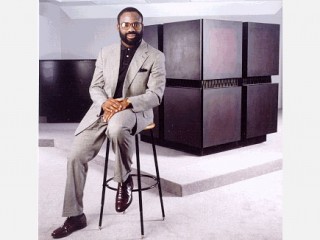
Philip Emeagwali biography
Date of birth : 1954-08-23
Date of death : -
Birthplace : Akure, Nigeria
Nationality : Nigerian
Category : Science and Technology
Last modified : 2010-10-06
Credited as : Engineer, computer scientist, man with an IQ of 190
64 votes so far
Life
Emeagwali was born in Akure, Nigeria on 23 August 1954. He dropped out of school in 1967 because of the Nigerian-Biafran war. When he turned fourteen, he was conscripted into the Biafran army. After the war he completed a high-school equivalency through self-study and went to the United States to study under a scholarship after taking a correspondence course at the University of London.[citation needed] He received a bachelor's degree in mathematics from Oregon State University in 1977. He was also working as a civil engineer at the Bureau of Land Reclamation in Wyoming during this period.
Awards
Emeagwali received a $1,000 1989 Gordon Bell Prize, based on an application of the CM-2 massively-parallel computer for oil-reservoir modeling. He won in the "price/performance" category, with a performance figure of 400 Mflops/$1M, corresponding to an absolute performance of 3.1 Gflops. The other recipient of the award, who won in the "peak performance" category for a similar application of the CM-2 to oil-related seismic data processing, actually had a price-performance figure of 500 Mflops/$1M and an absolute performance of 6.0 Gflops, but the judges decided not to award both prizes to the same team. Emeagwali's simulation was the first program to apply a pseudo-time approach to reservoir modeling.
Apart from the prize itself, there is no evidence that Emeagwali's work was ever accepted for publication in the peer-reviewed scientific literature, nor that it had any other lasting impact on the field of high-performance computing or the development of the Internet. Neither does he hold any recognized patents for his results. (He does, however, own a US trademark for his website name, "EMEAGWALI.COM".) Nevertheless, Emeagwali was voted the "35th-greatest African (and greatest African scientist) of all time" in a survey by New African magazine. His achievements were quoted in a speech by Bill Clinton as an example of what Nigerians could achieve when given the opportunity. He is also a frequent feature of Black History Month articles in the popular press.
















